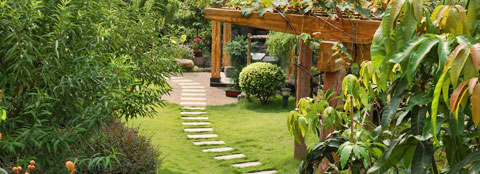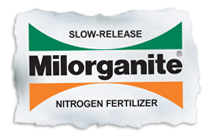Using Milorganite in Landscapes

One product for all your landscape needs!
Goof Proof Application - No Need to Water In
Milorganite is very low in salt; therefore it will not burn your lawn or any plant in your landscape. Since it's non burning, there’s no need to water it in. Best of all, you don’t have to worry about “striping” the lawn; you just can’t screw it up!
Non Staining Iron for Enhanced Greening
Not only will Milorganite provide exceptional greening for all your landscape plants, it will NOT stain nearby walks, patios, drives, or fences like other fertilizers can. Milorganite’s iron is organically complex, meaning it stays in a form that is readily available to the plant roots. This iron helps turf maintain its color longer, even during periods of high stress.
Seeding and Sodding
Milorganite contains nutrients that are required for a fast developing lawn. The slowly available nitrogen releases as the seedling needs it. The non leaching phosphorus is available to immature roots to aid in giving energy to support fast growth. Iron greens the new lawn, giving it a mature look before its time.
Tree and Shrub Installation
Trees and shrubs, being slow growing compared to most other yard plants, like fertilizers that release slowly and evenly. Milorganite is an excellent source of slow release nitrogen.
Fall Fertilizing
Research shows that lawns fertilized with Milorganite in the fall tend to become green one to two weeks earlier than unfertilized lawns. Not only do Milorganite-treated lawns sustain less winter damage, they also recover more quickly from any damage that does occur because fall feeding encourages root growth before winter sets in. The resulting thick turf minimizes weed growth because it shades weed seedlings, preventing them from maturing.
Environmentally Friendly
Milorganite’s slow release, water insoluble formula provides essential nutrients over an eight to ten week period, minimizes the problems of excessive growth, and resists leaching. The phosphorus in Milorganite acts differently than the P in other fertilizers as well. The phosphorus is slow release, available to the plant as the plant requires it in adequate (but not excessive) amounts, therefore, making it less likely to leach. Naturally occurring P is typically chemically bound up in the soil and not available for plant uptake. Research indicates that naturally occurring phosphorus “binds” to Milorganite and in turn becomes more readily available for plant uptake, and less likely to leach into rivers, lakes, and streams. Children and pets can safely go onto areas that have been fertilized with Milorganite.

